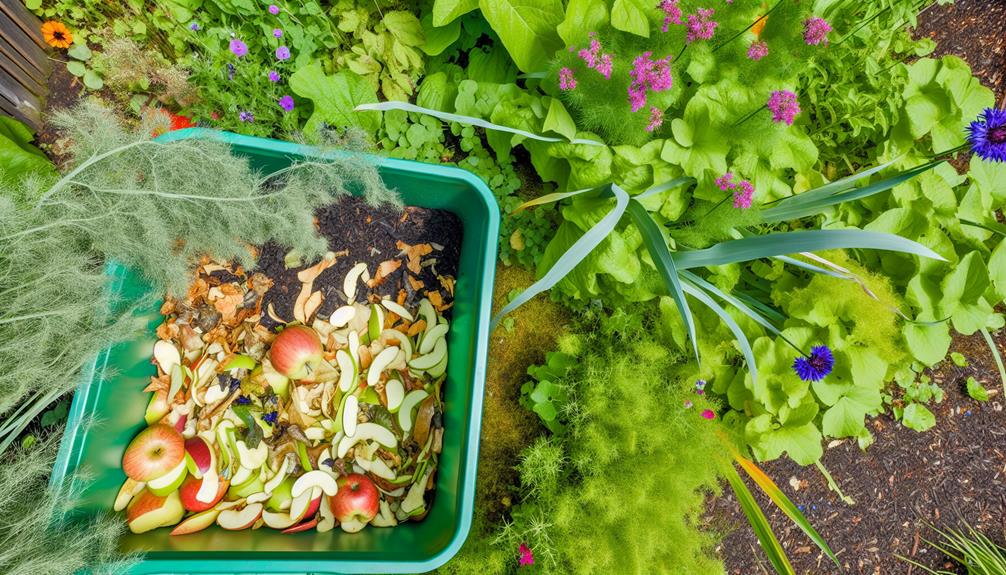

You can compost apple cores, and it’s a great way to reduce kitchen waste. Apple cores decompose quickly, adding essential nutrients like potassium and calcium to your compost. Make sure to cut the cores into smaller pieces to speed up the process, and remove any stickers or non-organic materials.
Mix them with other compost materials to balance the carbon-to-nitrogen ratio. Regularly turn your compost pile to promote quicker breakdown, and maintain proper moisture levels. By composting apple cores, you’ll enrich your soil and contribute to a healthier garden. Want more tips on efficient composting methods and challenges? Keep up!
Ever wondered why composting apple cores is such a great idea?
First, it reduces your kitchen waste to a large extent. Instead of tossing apple cores in the trash, you can turn them into valuable compost.
Composting helps divert organic waste from landfills, reducing methane emissions, which are harmful to the environment.
Apple cores decompose quickly, speeding up the composting process. They contribute to the overall moisture content in your compost bin, helping to maintain a balanced environment for decomposition.
Additionally, apple cores attract beneficial microorganisms that break down organic material. By composting apple cores, you’re making a simple yet effective choice to support sustainability and reduce your carbon footprint.
Apple cores are rich in nutrients that can greatly enhance the fertility of your soil. When you compost apple cores, you’re adding valuable nutrients like potassium, phosphorus, and calcium to your compost pile. These elements are essential for healthy plant growth. Potassium helps plants build strong roots and resist diseases, while phosphorus promotes flowering and fruiting. Calcium improves soil structure and helps regulate soil pH levels.
To maximize the nutritional benefits, make sure the apple cores are well-distributed in your compost pile. Mixing them with other organic materials like leaves, grass clippings, and kitchen scraps will create a balanced compost. This balance ensures a steady breakdown process, releasing nutrients slowly and steadily into your garden soil, thereby enriching it over time.
Also Read: Can You Compost Azuki Beans?
Before adding apple cores to your compost, it’s important to prepare them properly to guarantee they break down efficiently. Start by cutting the apple cores into smaller pieces. This increases the surface area, speeding up decomposition.

Remove any stickers or non-organic materials from the cores, as these won’t decompose and can contaminate your compost. Make sure to mix the apple pieces with other compost materials like leaves, grass clippings, or kitchen scraps to maintain a balanced carbon-to-nitrogen ratio.
Turning the compost pile regularly helps aerate it, promoting faster breakdown. By following these steps, you’ll ensure that your apple cores decompose effectively and contribute valuable nutrients to your compost.
Also Read: Can You Compost Bacon?
When composting apple cores, you’ll find different methods offer unique benefits. Backyard composting is straightforward and lets you manage waste at home.
While vermicomposting uses worms to speed up decomposition.
For larger quantities, industrial composting provides a more efficient solution, especially for municipalities and large-scale producers.
In backyard composting, you can effectively break down apple cores by incorporating them into various compost types like cold, hot, and vermicomposting systems.
For cold composting, simply add your apple cores to the pile and turn it occasionally. It takes longer but requires less maintenance.
In hot composting, chop the apple cores into smaller pieces and layer them with green and brown materials. This method speeds up decomposition, producing compost in weeks rather than months. Remember to maintain proper moisture and aeration. Avoid large chunks that can attract pests.
Vermicomposting transforms apple cores into nutrient-rich compost by utilizing the digestive power of worms. Start by setting up a worm bin, ensuring proper ventilation and drainage. Use bedding materials like shredded newspaper or coconut coir.
Chop apple cores into small pieces to speed up decomposition and prevent odors. Mix them with other organic waste to maintain a balanced diet for the worms. Monitor moisture levels; the bin should feel like a damp sponge.
Avoid overloading the bin with apple cores to prevent an imbalance. Harvest the compost every few months by separating the worms from the finished product. This worm castings-rich compost can be used to enrich garden soil, providing essential nutrients for plants.
Industrial composting offers a streamlined way to convert apple cores into valuable compost, benefiting both the environment and agricultural productivity. You’ll find that industrial composting facilities are designed to handle large volumes of organic waste efficiently. They use high temperatures and controlled conditions to accelerate the decomposition process. This means your apple cores break down faster compared to home composting.
Additionally, industrial composting can manage a wider variety of waste, including items that mightn’t decompose well in a home compost bin. By participating in industrial composting programs, you’re contributing to reduced landfill waste and producing nutrient-rich compost that can enhance soil health.
Look for local composting facilities or municipal programs to get started.
Also Read: Can You Compost Cotton Balls? The Shocking Truth Revealed!
Composting apple cores can sometimes present challenges like odor issues and pest attraction, but with the right techniques, you can easily overcome these hurdles.
First, make sure you’re maintaining a proper balance of green and brown materials. Apple cores are considered green materials, rich in nitrogen, so mix them with carbon-rich brown materials like dry leaves or shredded paper.
Turn the pile regularly to aerate it and speed up decomposition. Also, avoid adding excessive apple cores at once, as this can lead to a soggy, smelly pile. Finally, keep your compost bin covered and monitor moisture levels to prevent it from becoming too wet or too dry.
To keep pests and odors at bay, make sure your compost pile is well-balanced and properly maintained. Start by layering your apple cores with other organic materials. Guarantee a good mix of ‘greens’ (like fruit scraps) and ‘browns’ (like leaves).
Here’s how to avoid common issues:
Always cover fresh food scraps with a layer of soil or browns.
Keep your compost moist but not soggy.
Aerate by turning the pile regularly to speed up decomposition and reduce odor.
These attract pests and create strong odors.
Also Read: Can You Compost Bacon Grease?
To speed up the decomposition of your apple cores, make sure to maintain proper moisture levels in your compost.

Also, balance the carbon-nitrogen ratio by mixing green materials like fruit scraps with brown materials like dried leaves.
These steps will create an ideal environment for microorganisms to break down the waste more efficiently.
Ensuring your compost pile stays moist but not soggy is essential for speeding up the decomposition of apple cores. Aim for a consistency similar to a wrung-out sponge.
Here’s how you can maintain proper moisture levels:
Balancing the carbon-nitrogen ratio in your compost pile is crucial to accelerating the decomposition of apple cores. Aim for a ratio of about 30:1.
Apple cores are rich in nitrogen, so you’ll need to add carbon-rich materials like dried leaves, straw, or shredded paper to maintain a balance. Too much nitrogen can make the pile smell bad and slow down the process.
Mix your compost pile regularly to guarantee even distribution. A good rule of thumb is to add one part green (nitrogen) materials to three parts brown (carbon) materials. This balance helps create the ideal environment for microorganisms to break down the compost efficiently.
Keep an eye on your pile and adjust as necessary to uphold this ratio.
Also Read: Composting Orange Peels: The Hidden Truth
When you start composting apple cores, you’re not just reducing waste; you’re also creating nutrient-rich soil for your garden.
To make the process more eco-friendly, consider these tips:
Following these tips ensures your compost pile remains active and productive, enriching your garden soil efficiently.
To conclude, composting apple cores is a simple and effective way to enrich your soil. Make sure you chop them up to speed up decomposition and prevent pests.
Mix them well into your compost pile, whether it’s a backyard bin or a worm composting system. By doing so, you’ll reduce waste and enhance your garden’s health.
Remember, proper composting practices minimize odors and maximize benefits. Follow these tips, and your garden will thrive.
